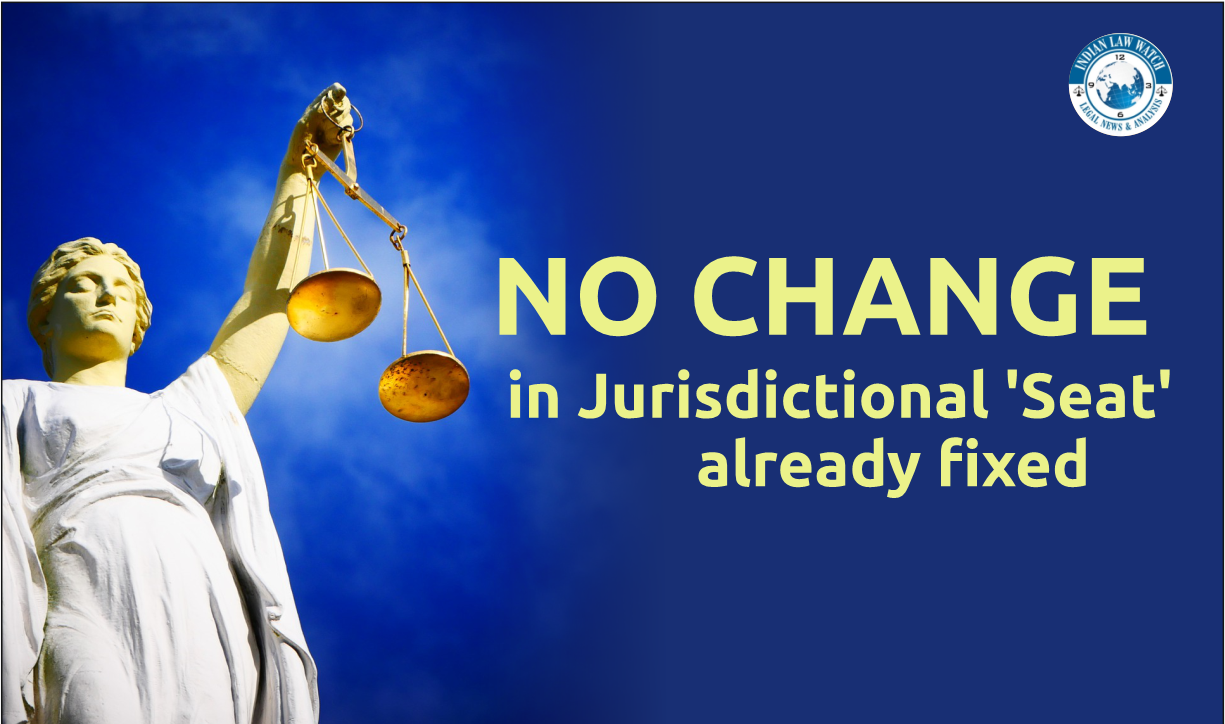
Appointment of a New Arbitrator holding proceedings at a different Venue would not change Jurisdictional ‘Seat’ already fixed by earlier Arbitrator: Supreme Court.The Supreme Court while answering a captivating issue, held that appointment of a new arbitrator who holds the arbitration proceedings at a different location would not change the jurisdictional ‘seat’ already fixed by the earlier or first arbitrator.
BBR (India) Pvt. Ltd. v. S.P. Singla Constructions

The dispute between BBR (India) Pvt. Ltd. (the ‘appellant’) and S.P. Singla Constructions Pvt. Ltd. (the ‘respondent’) arises out of a contract for the supply and installation of cable stays cable-stay bridge being constructed by the respondent over the river Ravi at Basouli, Jammu and Kashmir. The Arbitration clause in the contract stated that
“Save where the decision of the contractor is final and binding on the subcontract any dispute difference arising between the contractor and sub-contractor relating to any matter. In the first instance shall be attempted to be resolved by the arbitration of the sole arbitrator to be appointed by the managing director of S.P. Singla Constructions Pvt. Ltd.”
Therefore, the clause is silent on the seat or venue of the arbitration. Further, the contract and letter of intent were executed at Panchkula in Haryana, the corporate office of the respondent is also located at Panchkula, Haryana and the registered office of the appellant is located in Bengaluru, Karnataka.
Arbitration was initiated between the parties and Mr. Justice (Retd.) N.C. Jain was appointed as the sole arbitrator. After a few proceedings, Mr. Justice (Retd.) N.C. Jain could not continue. Therefore, Mr. Justice (Retd.) T.S. Doabia was appointed as the new arbitrator and in his first procedural order, he stated that the venue of the proceedings would be Delhi. The parties had already filed a Statement of claim, Statement of defence, and even a rejoinder before the previous tribunal. They were yet to file their evidence by way of affidavits. Hence, hearings were held, witnesses were cross-examined, the arguments were addressed and an award was passed in Delhi.
Aggrieved from the award, the appellant filed a petition challenging the award under Section 34 of the Act before the Delhi High Court. Subsequently, the respondent also applied to interim orders under Section 9 of the Arbitration and Conciliation Act, 19964 before the Additional District Judge, Panchkula. Thus, both parties invoked the jurisdiction of two different courts which gave rise to the question of the ‘jurisdictional seat of arbitration’.

The court observed that there holding subsequent hearings at a different location than the place fixed by the arbitrator as the seat of arbitration should not be regarded and treated as a change or relocation of jurisdictional ‘seat’, as the same would be chaotic leading to avoidable esoteric and hermetic litigation. Therefore, once the tribunal has fixed a jurisdictional seat under Section 20(2), the same should remain static and fixed whereas the venue is not constant and can move in terms of Section 20(3).
The Court further observed that the law of arbitration does not visualise repeated and constant shifting of the seat of arbitration and has in fact specifically drawn a distinction between seat and venue in Section 20(3) by stating that “for convenience and other reasons, the arbitration proceedings may be held at a place different than the ‘seat of arbitration’, which location is referred to the venue of arbitration.”
Further, relying on the observation in C v. D the court noted that if the argument that seat changes with location is accepted, it would “create a recipe for litigation and (what is worse) confusion which was not intended by the Act. The place of jurisdiction or ‘the seat’ must be certain and static and not vague or changeable, as the parties should not be in doubt as to the jurisdiction of the courts for availing of judicial remedies. Further, there would be a risk of parties rushing to the courts to get first hearing or conflicting decisions that the law does not contemplate and is to be avoided.”
While dismissing the appeal, the bench held:
“Once the jurisdictional ‘seat’ of arbitration is fixed in terms of sub-section (2) of Section 20 of the Act, then, without the express mutual consent of the parties to the arbitration, ‘the seat’ cannot be changed. Therefore, the appointment of a new arbitrator who holds the arbitration proceedings at a different location would not change the jurisdictional ‘seat’ already fixed by the earlier or first arbitrator. The place of arbitration in such an event should be treated as a venue where arbitration proceedings are held.”







